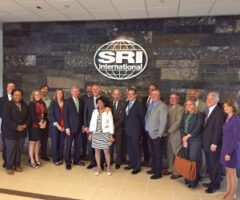As the news headlines tell us daily, emerging and re-emerging infectious diseases are a growing threat. Viruses such as Zika, Middle Eastern Respiratory Syndrome (MERS) and yellow fever are causing illness and significant concern around the globe.
There are many causes for the emergence and spread of these diseases: commercial air travel (which provides fast and free cross-continental transportation for any microbe), global trade, urbanization, unchecked population growth and climate change. Addressing any of these challenges is a long-term endeavor at best – and in some cases an impossibility.

So what will help us protect human lives against these frightening emerging and re-emerging illnesses? Smart, innovative and collaborative science.
At SRI Biosciences Center for Infectious Diseases, we have committed to help eliminate the global spread of infectious diseases. Our goal is to take pandemics off the table by stopping them before they happen. With support from the Commonwealth of Virginia and the larger Shenandoah Valley community, we have established a facility in Harrisonburg, VA that provides an ideal environment for research, development and training around infectious diseases transmitted between humans by insects and animals (known as vector-borne diseases). These include mosquito-borne diseases such as Zika and West Nile Virus, but also diseases transmitted by bats and rodents (e.g., MERS, influenza, hantaviruses).
Our facility was honored recently by a visit from Virginia Governor Terry McAuliffe and numerous other esteemed guests. Governor McAuliffe was intrigued by our team’s work to combat the Zika virus, as well as our ability to contribute to the local economy.
Several months ago, SRI formed a Zika-virus task force to determine how we can best apply our organization’s broad range of scientific capabilities to tackle this emerging global threat. Representatives of our infectious disease team will work with reproductive toxicologists (who understand how drugs and vaccines affect pregnancy), neuroscientists (who understand brain development in the fetus), and experts on mosquito ecology to find ways to prevent and treat Zika infection and it’s severe effects on the developing fetus. This research is led out of our Harrisonburg facility and has already led to new tools for drug discovery, and compounds that are being advanced toward the clinic. We are also developing novel animal models of Zika infection in pregnancy.
Our approach to Zika reflects the core values of SRI. Expertise is obviously key, but we are committed to collaboration. No individual, team or organization – no matter how expert – can tackle challenges as big as pandemic diseases alone. Collaboration within SRI, as well as with external organizations and experts, can greatly accelerate scientific research and, in some cases, is absolutely vital to it.
As I told Governor McAuliffe and his colleagues, SRI’s Harrisonburg facility and the progress we’ve made to date wouldn’t be possible without the support and partnership we’ve received from the Commonwealth of Virginia, as well as multiple other Shenandoah Valley government, academic, economic and workforce development, and community organizations. Each has contributed immeasurably to our ability to build a world-class research facility, recruit a very capable work force, operate efficiently and train the scientists who will lead infectious disease research in the future.


